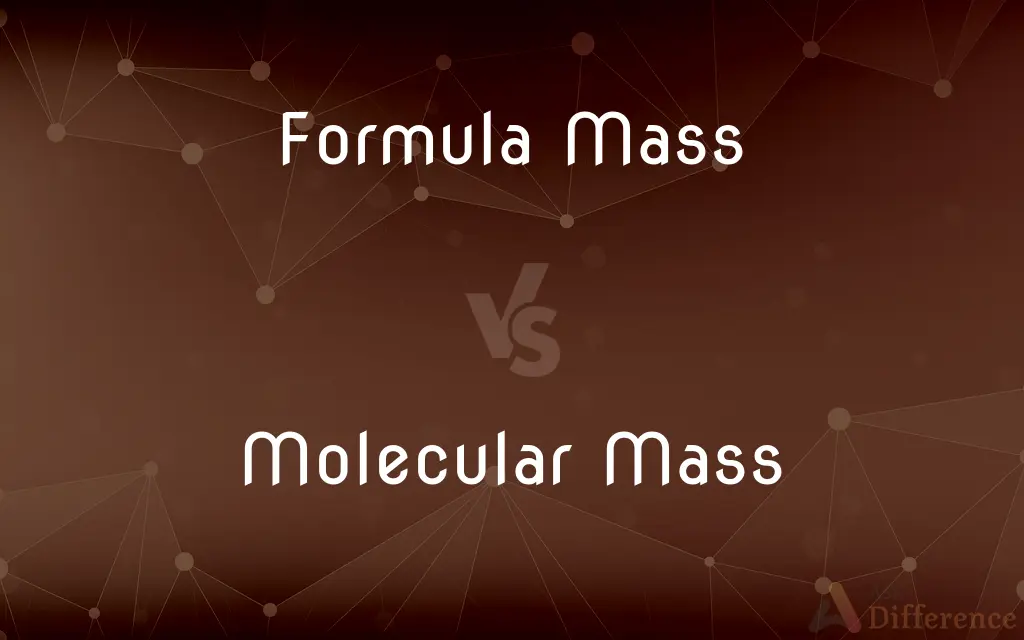Formula Mass vs. Molecular Mass — What's the Difference?
By Tayyaba Rehman — Published on December 31, 2023
Formula Mass refers to the sum of atomic masses in a formula unit; Molecular Mass is the sum of atomic masses in a molecule.

Difference Between Formula Mass and Molecular Mass
Table of Contents
ADVERTISEMENT
Key Differences
Formula Mass relates to the calculation of the sum of the atomic masses of all atoms in a formula unit of a substance. This concept is primarily used for ionic compounds where individual molecules are not present. Molecular Mass, conversely, pertains to covalent compounds, encompassing the total atomic mass of all atoms within a single molecule.
The calculation of Formula Mass involves summing the atomic masses, each multiplied by its respective frequency in a formula unit. Meanwhile, the calculation of Molecular Mass also involves summing atomic masses in a molecule. However, Molecular Mass applies strictly to substances that consist of distinct molecules, typically covalent compounds.
Formula Mass can relate to compounds like salts (e.g., NaCl) where discrete molecules do not exist due to the ionic nature of their bonds. In the case of Molecular Mass, it generally applies to substances where distinct molecules, like H2O, are present, ensuring specificity in the mass pertaining to one molecule.
When assessing Formula Mass, it is pivotal to account for the mass of atoms in the empirical formula of a compound. In contrast, when discussing Molecular Mass, the substance in question must have a definable molecule, and the mass is calculated based on this molecular formula.
Notably, Formula Mass is crucial for understanding and calculating stoichiometry in ionic compounds. Conversely, Molecular Mass is vital in calculating stoichiometry in covalent compounds, underlining the contextual importance and application of each term in different chemical scenarios.
ADVERTISEMENT
Comparison Chart
Application
Used for ionic compounds
Used for covalent compounds
Unit
Calculated using the empirical formula
Calculated using the molecular formula
Involvement
Involves atoms in a formula unit
Involves atoms in a discrete molecule
Example
Applicable to NaCl
Applicable to H2O
Bonding
Pertains to ionic bonding
Pertains to covalent bonding
Compare with Definitions
Formula Mass
Formula Mass encompasses the atomic masses in a formula unit.
In Na2CO3, the Formula Mass sums the atomic masses of Na, C, and O.
Molecular Mass
Molecular Mass is relevant to covalent compounds.
H2O2 has a Molecular Mass derived from the masses of H and O atoms.
Formula Mass
Formula Mass calculates the atomic mass in a formula unit.
The Formula Mass of NaCl is calculated as 22.99 (Na) + 35.45 (Cl) = 58.44 u.
Molecular Mass
Molecular Mass is utilized for stoichiometry in covalent compounds.
The Molecular Mass of CH4 is crucial for stoichiometric calculations.
Formula Mass
Formula Mass is utilized for ionic compounds.
Na2SO4 has a Formula Mass which is derived from its empirical formula.
Molecular Mass
Molecular Mass ensures specificity to a particular molecule’s mass.
N2’s Molecular Mass considers the mass of two nitrogen atoms.
Formula Mass
Formula Mass doesn’t pertain to discrete molecules.
Despite no discrete NaCl molecule, its Formula Mass can be calculated.
Molecular Mass
Molecular Mass applies to substances with definable molecules.
CH4 has a Molecular Mass calculated from its specific molecular formula.
Formula Mass
Formula Mass involves empirical formulas in its computation.
The Formula Mass of (NH4)2SO4 involves each atom’s mass in the formula.
Molecular Mass
Molecular Mass sums the atomic masses in a distinct molecule.
The Molecular Mass of H2O is 18.02 u, summing H and O's masses.
Common Curiosities
Is Molecular Mass applicable to all substances?
No, only to those with discrete molecules, typically covalent compounds.
Can Molecular Mass be equal to Formula Mass in any scenario?
Yes, in cases where the empirical and molecular formulas are identical.
What is the key distinction between Formula Mass and Molecular Mass?
Formula Mass involves ionic compounds, while Molecular Mass involves covalent compounds.
Can Formula Mass be used for covalent compounds?
Typically no, as Molecular Mass is used for covalent compounds.
Why is Formula Mass used for ionic compounds?
Ionic compounds don’t have discrete molecules, warranting Formula Mass use.
Can we calculate Formula Mass without an empirical formula?
No, the empirical formula is vital for Formula Mass calculation.
How is Molecular Mass related to molar mass?
For molecular substances, the Molecular Mass is equal to the molar mass.
Can Formula Mass be determined for a complex ionic compound?
Yes, using the empirical formula, even for complex ionic compounds.
Is Formula Mass relevant in molecular compound reactions?
No, Molecular Mass is used for stoichiometric calculations in such reactions.
Does Formula Mass pertain to the mass of a single atom?
No, it involves the sum of atomic masses in a formula unit.
What is the significance of Molecular Mass in chemical reactions?
It’s crucial for stoichiometry, determining molar ratios in reactions.
Why doesn’t Formula Mass apply to molecular substances?
Molecular substances utilize Molecular Mass due to their specific molecules.
Does the Molecular Mass of a molecule remain constant?
Yes, it remains constant unless the molecular formula changes.
How does Molecular Mass facilitate understanding gas behaviors?
Through laws like Graham's law, which utilizes Molecular Mass.
Does Molecular Mass provide insights into compound composition?
Yes, it provides mass ratios of constituent atoms in a molecule.
Share Your Discovery

Previous Comparison
Giffen Goods vs. Inferior Goods
Next Comparison
Operating System vs. Application SoftwareAuthor Spotlight
Written by
Tayyaba RehmanTayyaba Rehman is a distinguished writer, currently serving as a primary contributor to askdifference.com. As a researcher in semantics and etymology, Tayyaba's passion for the complexity of languages and their distinctions has found a perfect home on the platform. Tayyaba delves into the intricacies of language, distinguishing between commonly confused words and phrases, thereby providing clarity for readers worldwide.













































